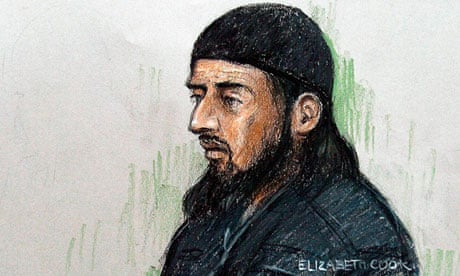An aide of the extremist preacher Abu Hamza has had his extradition from Britain to the US for alleged terrorism offences blocked by the European court of human rights.
Removing Haroon Aswat, a UK-based terror suspect whose nationality is unknown, to an American "supermax" high-security prison would constitute "inhuman or degrading treatment", the Strasbourg court ruled.
The decision barring his extradition from Broadmoor psychiatric hospital, where he is being held, to the US was made on account of his severe mental illness.
Aswat, who has paranoid schizophrenia, has been indicted in the US as a co-conspirator in a plan to establish a jihad training camp in Oregon, along with Hamza.
He was arrested in 2005 in Britain following a extradition request from US authorities. His lawyers have resisted his removal since then in a series of appeals.
Although in other extradition cases the ECHR had not found that conditions in ADX Florence facility in Colorado were unacceptable, it deemed that Aswat's case was different because of his mental health condition.
In its judgment, the court said it had given "full consideration to the submissions of the US department of justice … and observed, in particular, that it could not be determined with certainty in which detention facility or facilities Mr Aswat would be placed if extradited to the USA, either before or after trial.
"It was also unclear how long he might expect to remain on remand pending trial. As for his detention following a possible conviction … although Mr Aswat would have access to mental health services regardless of which prison he was be detained in, his extradition to a country where he had no ties and where he would face an uncertain future in an as yet undetermined institution, and possibly be subjected to the highly restrictive regime in ADX Florence, would violate article 3 of the convention."
Article 3 of the European convention on human rights prohibits inhuman or degrading treatment. Last year, the ECHR allowed the extradition of Babar Ahmad and four other suspects to US federal supermax prisons where inmates can spend 22 or 23 hours a day in solitary confinement.
After years of wrangling, Hamza was also finally extradited to the US to face terrorism charges. Aswat was told by Hamza to help set up the camp in Oregon in 1999, US officials believe. Aswat and another man, it is alleged, visited the proposed site of the camp in Bly that year.
A Home Office spokesman said: "We are disappointed that the European court of human rights found that extradition to America would breach Haroon Aswat's human rights.
"The judgment does not become final for three months and we will consider as a matter of urgency all the legal options which are available to us. This includes whether we request a referral of the case to the court's grand chamber."
In a separate ruling, the court of appeal in London quashed the indeterminate sentences given to three members of an al-Qaida-inspired terror group that plotted to bomb the London Stock Exchange and build a terrorist training camp.
The court instead imposed "determinate" custodial sentences of 17 years and eight months in the case of one of them and 16 years in relation to the others.
The Islamist extremists had originally received the indeterminate sentences for public protection at London's Woolwich crown court in February last year.
The ECHR last year ruled as "arbitrary and unlawful" the operation of indeterminate sentences for the protection of the public (IPPs), currently being served by more than 6,000 prisoners in England and Wales. The IPP sentence is being replaced by a new extended determinate sentence.
Mohammed Shahjahan, now 29, was last year ordered to serve a minimum of eight years and 10 months, while fellow Stoke-on-Trent-based radicals Usman Khan, 22, and Nazam Hussain, 27, were ordered to serve at least eight years behind bars.
Allowing their sentence appeals, Lord Justice Leveson, sitting with Mr Justice Mitting and Mr Justice Sweeney, ruled that Shahjahan now has to serve 17 years and eight months, and Khan and Hussain 16 years.
All three received extended sentences meaning that each will have to spend an extra five years on licence after their release. The trio were originally sentenced along with six others - four of the nine were from Stoke, three from Cardiff and two from London.
The appeal judges said that having reduced the three sentences by removing the sentence for public protection, they had come to the conclusion that it was right to make a marginal adjustment to the term imposed on another appellant.
They knocked six months off the five-year sentence given to Mohibur Rahman, now 28, from Stoke-on-Trent, for possessing two copies of the online al-Qaida magazine Inspire for terrorist purposes.
The judges also dismissed a sentence appeal by Omar Latif, 29, from Cardiff, who was jailed for 10 years and four months, with an extended period on licence of another five years, for attending meetings with the intention of assisting others to prepare or commit acts of terrorism.










